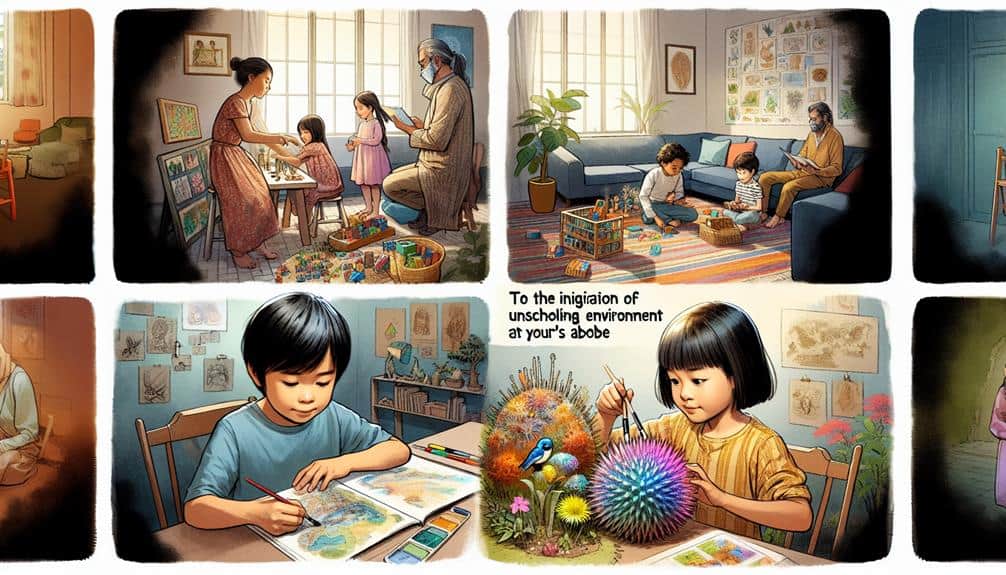Enhance your parent-child bond through unschooling, promoting personalized learning and strong communication. By embracing unschooling, you create a nurturing environment that fosters emotional intelligence and builds essential interpersonal skills. Encouraging open dialogue and active listening nurtures mutual understanding and respect. Trust and connection grow through consistent support and validation of emotions. Embrace the power of empowering your child within the relationship, nurturing creativity and independence. This method allows for individual growth by prioritizing curiosity, self-directed learning, and personalized goals. Strengthen your relationship further by exploring the benefits unschooling offers.
Key Points
- Prioritize open and honest communication to build trust and understanding.
- Encourage independence and choice within the relationship.
- Nurture creativity through engaging in creative activities together.
- Support individual growth by embracing self-directed learning.
- Create a supportive environment that fosters independence and personal development.
Benefits of Unschooling for Relationships
One significant advantage of unschooling is the strengthening of parent-child relationships through personalized learning experiences and increased communication opportunities. By tailoring education to your child's interests and learning style, unschooling fosters emotional intelligence by encouraging self-awareness and empathy. This personalized approach allows you to address your child's emotional needs and helps them develop strong interpersonal skills.
Mutual respect is a cornerstone of unschooling. By involving your child in decision-making regarding their education, you demonstrate respect for their autonomy and individuality. This mutual respect cultivates a sense of trust and openness in your relationship, laying a solid foundation for effective communication.
Research indicates that children who experience mutual respect within their families tend to have higher levels of emotional intelligence. They're better equipped to understand and manage their emotions, as well as empathize with others. Through unschooling, you have the opportunity to nurture these essential skills in your child, ultimately strengthening your parent-child relationship.
Communication in Unschooling Families
Effective communication within unschooling families is essential for fostering mutual understanding and collaborative learning experiences. In unschooling, active listening plays a vital role in establishing open dialogue between parents and children. Active listening involves fully concentrating, understanding, responding, and remembering what's being said. This approach allows each family member to feel heard and valued, promoting a sense of respect and empathy within the family dynamic.
Open dialogue further enhances communication by encouraging honesty and transparency. Parents and children can openly share their thoughts, feelings, and ideas without fear of judgment. This level of openness fosters trust and strengthens the parent-child relationship, creating a supportive environment for learning and personal growth.
Building Trust and Connection
How can parents and children in unschooling families cultivate trust and strengthen their connection?
Trust building and connection strengthening are essential components of relationship enhancement and bond reinforcement within unschooling dynamics. To foster trust, it's vital for parents to actively listen to their children's thoughts, feelings, and concerns without judgment. Validating their emotions and experiences can go a long way in building a strong foundation of trust. Additionally, being consistent and reliable in your actions helps children feel secure and nurtures a trusting relationship.
Creating opportunities for open communication is key to strengthening the parent-child connection. Encouraging regular check-ins where both parties can express themselves freely fosters mutual understanding and strengthens the bond between parents and children. Engaging in shared activities and interests can also deepen the connection by creating positive experiences and memories together.
Empowering Parent-Child Bond
To empower the parent-child bond in unschooling families, prioritizing open and honest communication lays a strong foundation for understanding and connection. Encouraging independence within the parent-child relationship fosters a sense of autonomy and self-reliance in children. By allowing children the freedom to make choices and decisions, parents show trust in their abilities, building confidence and strengthening the bond between them.
Moreover, nurturing creativity in children can be a powerful tool for enhancing the parent-child relationship. Engaging in creative activities together, such as art projects, storytelling, or exploring nature, not only sparks imagination but also creates shared experiences that deepen emotional connections. Encouraging children to express themselves creatively allows them to feel heard and understood, strengthening the bond with their parents.
Nurturing Individual Growth
Nurturing individual growth in unschooling involves cultivating a supportive environment that encourages exploration and self-discovery. By focusing on personal development and fostering independence, unschooling empowers children to thrive in their unique journeys.
Here are three key aspects to mull over:
- Encouraging Curiosity: Unschooling promotes a mindset where curiosity is valued and encouraged. By following their interests, children investigate subjects deeply, fostering a sense of passion and purpose in their personal development.
- Embracing Self-Directed Learning: Allowing children the freedom to choose what and how they learn nurtures independence. This approach not only enhances critical thinking skills but also builds confidence in their abilities, contributing to their overall growth.
- Supporting Individual Goals: Unschooling recognizes that each child has their own strengths and interests. By supporting and guiding them in pursuing their goals, parents can help children develop a strong sense of self and direction in life.
Frequently Asked Questions
Can Unschooling Hinder a Child's Social Development?
Unschooling may not inherently hinder your child's social skills. Research suggests that unschooled children often develop strong social skills through diverse peer interactions. Understanding the benefits of unschooling on social development can help alleviate concerns.
How Can Unschooling Parents Address Academic Concerns?
To address academic concerns in unschooling, you can work with your child on setting goals and creating a flexible learning plan. Provide enthusiastic parental support, utilize resources, and celebrate even the smallest academic progress.
What Role Do Extended Family Members Play in Unschooling?
When it comes to unschooling, extended family members, especially grandparents, can provide valuable support and diverse perspectives. Involving them can enhance your child's learning experiences and strengthen sibling dynamics through shared activities and mentorship.
Is Unschooling Suitable for Children With Special Needs?
Unschooling, with its individualized approach and flexibility in learning, can be suitable for children with special needs. Research shows that 83% of parents find unschooling beneficial for children with diverse learning requirements.
How Do Unschooling Families Handle Conflicts Within the Household?
When handling conflicts within the household, unschooling families prioritize open communication and effective conflict resolution strategies. By fostering a culture of understanding and active listening, parents and children can navigate disagreements constructively and strengthen their relationships.



